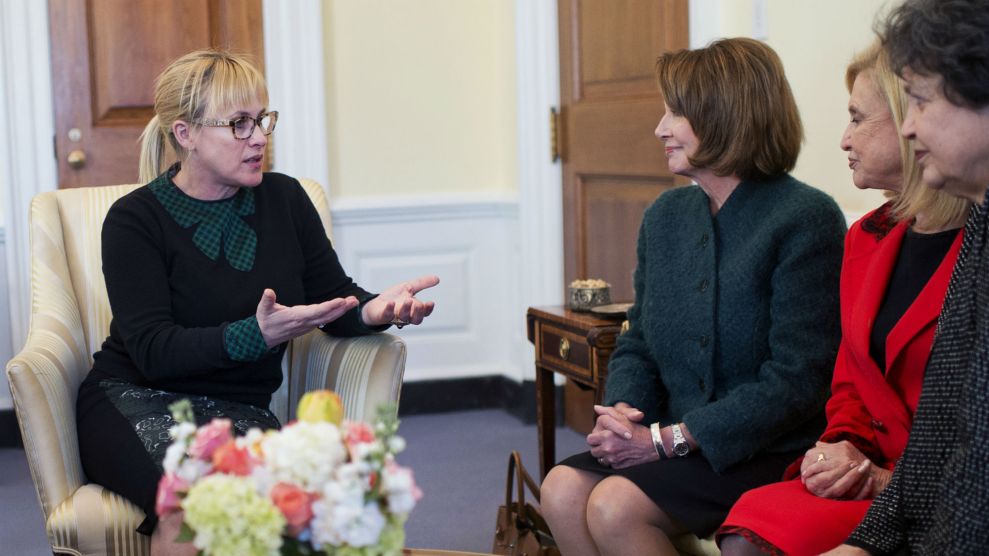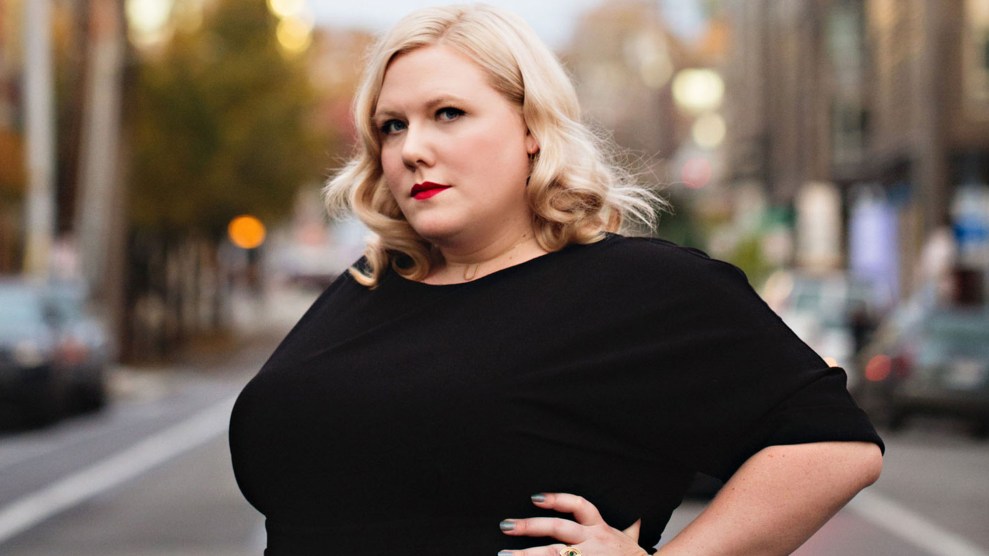
Actress Patricia Arquette, House Minority Leader Nancy Pelosi, Reps. Carolyn Maloney, D-N.Y., and Lois Frankel, D-Fla., conduct a meeting in the Capitol to discuss the Paycheck Fairness Act and "House Democrats’ economic agenda for women and families," April 13, 2016.Tom Williams/CQ Roll Call via AP Images
Patricia Arquette recites statistics about unequal pay and domestic violence as if they were the memorized phone numbers of close friends. It’s clear the Boyhood actress has been studying hard in preparation for her higher profile in activism and lobbying around women’s rights. At the Women in Technology International Summit, we caught up with Arquette to talk feminism, the 2016 election, and her comments at last year’s Oscars.
Mother Jones: Tell me about some of the conversations you’ve had with members of Congress.
Patricia Arquette: I have two more trips planned to talk about women’s issues, like the need to pass the Equal Rights Amendment, which was a big movement in the 70’s and was three states short of getting ratified. A friend of mine just made a documentary called Equal Means Equal. She makes a comprehensive argument about why women need the Equal Rights Amendment, and she looks at all the ways that women are dealing with levels of bias in different areas. We have hundreds of thousands of untested rape kits across the country. Some states still don’t even know how many rape kits they have, where they are, or what the plan is. There are states like Louisiana, where if you were convicted of a felony in the last five years, or if you were committing a crime at the time of your rape, you don’t even get a free DNA rape kit. It’s absurd. There are other states where women have to petition every six months not to have their rape kits destroyed.
We have fair pay issues from state to state. Chris Christie recently blocked some legislation that would have forced contractors to report to the government not just what they pay managers, but what they pay female managers compared to male managers. It’s going to take from 40 to 118 years for the pay gap to close for women if we just go along with the status quo, so we need some serious, radical change. Luckily in California, Sen. Hannah Beth Jackson, Gov. Brown, and the Equal Rights Advocates came together and worked on legislation that helped pass the strongest fair pay bill in the nation. But this is something every American woman should have.
There are so many issues that impact women. When we talk about prison reform, for example, women were [once] sterilized in women’s prisons. When they were giving birth, they were asked to sign paperwork but they weren’t even completely conscious of what they were signing. That sounds like something that would never happen in America, but it was happening, not just in America, but in [California], one of the most progressive states in the United States. The United States has more women and girls in prison than any other industrialized nation on earth. The fastest growing group of incarcerated people—and it has been the fastest growing rate for decades—are women of color. We also have sisters like Ashley Diamond, who was raped in prison, reported her rape, and then was put in the same cell with her rapist.
MJ: You have been especially outspoken about equal pay for women. Could you explain what about it keeps you up at night?
PA: There’s a ripple effect in being underpaid for women. Ten thousand women are turned down every day for domestic abuse shelters. Part of domestic abuse is often economic suppression; the male might take your paycheck every week and never give you money or allow you to work because he’s too jealous. The number-one reason women say they returned to their abuser is financial insecurity. Often they have kids with them. They say half of the 66 million women and kids living in poverty in the US wouldn’t be if women were just paid their full dollar. That’s an enormous impact we could make on child hunger. One in five kids are hungry in America right now. It’s not just conceptually the correct thing to do; it’s the thing we must do as a nation. When the woman is getting paid drastically less than the male, that whole family is impacted. So when I talk to different lawmakers, I’m trying to get them to reach across the aisle. There’s legislation out there that would be helpful for women and families, but like with the Paycheck Fairness Act, legislation has been on the floor many times, and voted down many times. It’s something we need to get passed already.
MJ: Do you feel like you’ve been well received when you meet with members of Congress?
PA: I’ve felt pretty good about the meetings. Not that I’ve gotten anyone to really—OK, maybe I’ve gotten little commitments, I’ll just say that. I’ve been getting more openness than I expected. But I have met senators, people in the House, who didn’t even know there were rape kits that weren’t processed. One of the most disturbing things I heard was that women’s issues weren’t “hot.” Which is so ironic, because women are constantly being judged on some “hot” level. The conversation is not hot enough for them to do anything about. We have to make it hot, make them feel the fire. Until then, a lot of them aren’t going to do anything.
MJ: So how does all this play into the election?
PA: This is the strangest election on earth. I’m shocked. It’s bizarre. I keep wanting to wake up from this bad, bad dream.The good news is that we have a very active part of the country that wants some radical progress. Hopefully, we can appeal to that group of people. I would say more Bernie Sanders supporters; I’m not talking about Donald Trump supporters. I hope people become more active.
I worry about women globally. When we talk about having a presidential candidate who would tear up the Paris accords, who doesn’t believe in global warming, we know that poor women and children are going to be the most vulnerable when we start seeing rapid effects of global warming. I find it incredibly offensive that Donald Trump was offered this debate with Bernie Sanders, he accepted it, he asked for $10 million, he said he said he would match the amount, and wanted the money to go to women’s health charities. Then he said he wouldn’t debate because Bernie Sanders was the runner-up. But he always knew that Bernie Sanders was in second place. The idea that he can wave around $20 million in charity for women’s health and just blow it off is utterly repulsive and shocking. I don’t know why he’s getting away with that. Health clinics all over are closing, so poor women aren’t getting access to yearly pap smears anymore. So when this bozo throws away $20 million for women’s health, it’s reprehensible.
MJ: Who are you supporting for president?
PA: I’m supporting anyone except Donald Trump. [laughs]
MJ: You’re speaking at the Women in Tech International Summit this afternoon. Are women in tech of special interest to you?
PA: Some companies are doing amazing things. I went to Facebook, they were telling me that they’ve done analysis of how subconscious bias in action grows and grows. It’s like an upside-down pyramid. By the end, the ramifications of even a .1 percent unconscious bias play out in such a major way. There are real heroes for equal pay, like Marc Benioff at SalesForce who initiated his own gender audit. He always thought he was paying women fairly, but he found that he was underpaying women by $3 million a year. Over 40 years, that’s $120 million those employees would have missed. If you extrapolate that from company to company, you’re talking about billions of dollars being left on the table. Every day that a woman is making less money, that’s less money she has in retirement. In the United States we have more women in poverty than any other industrialized nation. The average woman loses a half million dollars over a lifetime, but women with higher degrees lose $2 million over a lifetime. We have Latinas in California making 55 cents on the dollar. Black women making 63 cents on the dollar. White women making 78 cents on the dollar. It doesn’t change very much year by year, it might go up or down a penny, but oftentimes, the years that it goes up are the same years that men are making a little bit more. It’s pretty much always in proportion.
MJ: I don’t know why they can’t just give us the damn dollar.
PA: Well, luckily, in California now, they have to. When the California Fair Pay Act passed, it was pretty miraculous, because companies had to start doing their own audits to look at it. Before, the way that the legal justice system works, even if a company paid women across the board less in every single area, a woman would have to prove intent to discriminate. But now, with this level of transparency, CEOs aren’t going to be able to say they didn’t know, because they’re going to look at their bottom line.
MJ: What has been your own experience with the wage gap?
PA: It concerns me when people frame the conversation about equal pay about the entertainment business. I don’t want the wage gap issue to be viewed as this myopic problem, because it’s not. It’s in 98 percent of all businesses, and it’s easy for people to dismiss this conversation when they think it’s around white women entertainers. But this is about all women in America.
MJ: When you won Best Supporting Actress in 2015, you used your acceptance speech to address wage inequality. What made you decide to speak out?
PA: Well, I knew it wasn’t something you’re supposed to do. It’s sort of an unspoken thing, that it can have a huge backlash on your career. There were a few jokes in some conversations about earlier political speeches that had controversial impacts. But I always knew I was going to do it anyway. I was winning an award for portraying a single mom who’d been the main breadwinner for her children. She was the main caretaker for her children, and she had to put herself through school and feed them. She was in a relationship she might not have stayed in as long because of this concept of financial security and the need to provide a home for her kids—all these subconscious things that play into choices that are made when you don’t have total autonomy, because you aren’t being paid fairly.
I’d written the speech down, but when they said my name, I felt like someone shot me with a tranquilizer. Time went really slow. I kind of felt like I was going to pass out, I just read what I wrote, and then I went backstage and I almost fainted. The adrenaline was sort of like being in a car accident. My mind just got totally confused; it was surreal and dreamlike and weird. It felt like it took me four years to get up there.
MJ: And you did get a lot of backlash for your comments backstage.
PA: The whole thing was such a whirlwind. I felt bad, because I know that a lot of black women felt like I was excluding them, or making them choose sides. That was never my intention, but I don’t blame them, because I can understand the way that I worded it, but that was never the way I felt. The way I felt was: Why is it acceptable that millions of women are paid less, they don’t have violent crimes investigated properly, they’re turned away from domestic abuse shelters with their children in tow, and then sent back to people that murder them or break their necks or bones or teeth. Where are our brothers? This is what I was saying. Where are our activist brothers? Why don’t they have our backs? I don’t think women are respected.
MJ: If you could go back, would you speak any differently?
PA: I would, I would make it clearer. But I would still say, ‘Hey brothers, where are you? Why does this not matter? This is a non-supported movement, why?’ I mean, look. I think if we educate each other about it, maybe it will become more clear. We have states that are throwing away the DNA of rapists? How can a woman be so inconsequential, that we as a nation aren’t standing up and doing something about this intimate, violent act?
But the speech was also in gratitude to my own mom. She’d been battling breast cancer for a long time, and she and my father were talking about getting a divorce. This was before Obamacare, so you could lose your insurance, and pre-existing conditions made it impossible to get insurance. My dad had moved on and he wanted to get divorced. She said, ‘No, you can’t, I can’t not have insurance. I’m ill. I’m going to die, I need health insurance.’ The reality is, even though she’d been in that marriage 32 years, within six months of getting a divorce, she would have been dropped from his insurance. I knew my mom’s story wasn’t the only story like that.
MJ: What drives you to be an activist? You’re an actor, you could take the cash and go. Why do you keep fighting?
PA: I know that I’ve had a very fortunate life, but also I think my job as an actor is to connect emotionally to human beings. I grew up really poor, and my mom had to make choices like that, and I was a single mom at 20. A lot of choices came out of that. I’ve seen a lot of my friends be in relationships they didn’t want to be in because they couldn’t leave. A lot of being an actor is being something that people imagine you to be. If you emote in your performances, people feel connected to you as an emotional person, because that’s how we communicate. That doesn’t mean people know you. At a certain point, I think you have to just be your own self.
















